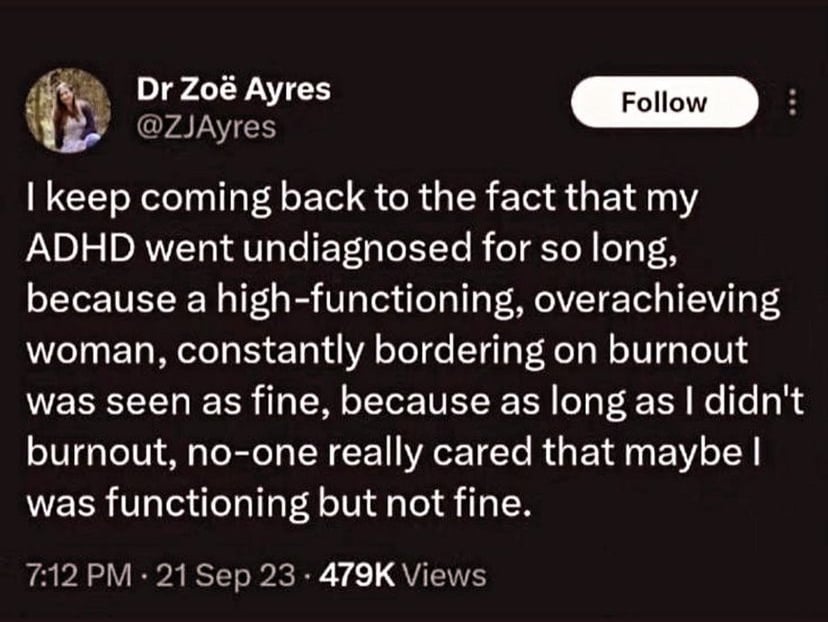this post was submitted on 24 Feb 2024
629 points (92.4% liked)
ADHD Women
1921 readers
1 users here now
A community for women to find support and discuss living with ADHD.
founded 1 year ago
MODERATORS
you are viewing a single comment's thread
view the rest of the comments
view the rest of the comments

You could replace the word woman with person and it still applies, seems a bit pointlessly gendered to me
Girls are significantly less likely to be diagnosed than boys and are more likely to get diagnosed later in life.
https://www.ncbi.nlm.nih.gov/pmc/articles/PMC10173330/
Edit: Underdiagnosis in female-presenting children will continue to be a problem until it is recognized and corrected. When this sort of silent type of ADHD is codified, the minority of boys with this type should also benefit as a result. It's a women's issue because it predominantly affects women. It's really gross to come into a women's space and essentially say "forget the many women; let's talk about the few men."
So? It's not like there arent also a statistically significant population of guys who are diagnosed later in life, and they often verge on burnout exactly as described in the post...
So? This is a women's community.
Fair, though a) she originally posted this to the world on Twitter, so in the original context it's a little odd to be needlessly gendering it, and b) I still correct my dad when he needlessly genders stories even if there are no other women around, it's still a bad habit that leads him to tell stories that sound exclusionary and mysoginistic.
https://www.ncbi.nlm.nih.gov/pmc/articles/PMC10173330/
It's not needlessly gendered to talk about issues that predominantly affect women.
I mean, 75% of adults suffering from ADHD are diagnosed in adulthood:
https://jamanetwork.com/journals/jamainternalmedicine/article-abstract/217065
If 2/3 of those are women, that means that 25% of adults with ADHD were diagnosed as children, 50% are women diagnosed as adults, and 25% are men diagnosed as adults, which is still a statistically significant proportion of the population.
That's a 20 year old paper. Diagnosis rates have risen a lot since then, and more recent studies suggest that boys still get diagnosed about 3 times more often than girls. I don't see the point of pretending like this isn't a gendered issue. We're talking about an issue that predominantly affects women. No one is saying that men aren't suffering. From an awareness standpoint, it makes more sense to draw attention to the larger population of sufferers to press the urgency of the issue. Once this silent type of ADHD that is more common in girls is codified, the boys with this type should benefit as well.
I wouldn't argue that it's not a gendered issue, or an issue impacted by gender, but I would argue that the test for whether or not you should gender something isn't whether or not it predominantly effects one gender, but whether or not you can replace the gender specific term with a gender neutral one and still get the same point across.
In this specific context, feeling constantly on the verge of being overwhelmed because you have undiagnosed ADHD is something that everyone with undiagnosed ADHD suffers through, whether they're men, women, or identify differently.
Or conversely, the majority of construction workers may identify as male, but it's still problematic to talk about construction jobs or problems with the construction industry as if it's a gendered issue that only men suffer with. If they were to talk about specific examples of say, male : male peer pressure, and male gender norm expectations that they were facing then it would make sense, but if they were just talking about something that every construction worker goes through then it would be a little odd and exclusionary to say something like "as a man, waking up for a 5am shift sucks".